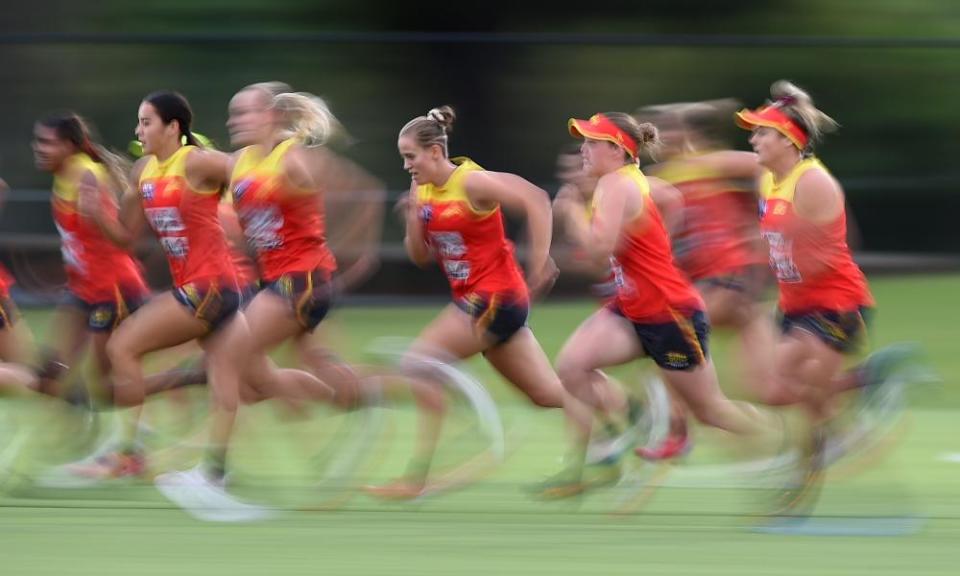AFLW is a premium sporting product. Is it still undervalued in its fifth season?

When the first AFLW game was planned for February 2017 between Carlton and Collingwood, it was to be held in the 7,000-seat Olympic Park Oval. It soon became clear the AFL had seriously underestimated the demand for live women’s football and the game was transferred to the 22,000 seat Ikon Park.
Still, that was not big enough to hold all of those who wanted to attend; 24,568 managed to pack into the ground, while thousands more were locked outside. AFL CEO Gillon McLachlan had to personally apologise to those who missed out.
Four years on, the 2021 season will be the first in which tickets will be available for purchase, rather than spectators entering free of charge. It is a change that fans of the game have long been crying out for – keen to support the hard-working players and seeking recognition from administrators that AFLW is a premium product that has value to the thousands of people who wish to see each game live.
Related: Cautious optimism heralds start of new AFLW season after crushing 2020 | Kirby Fenwick
But, with tickets to the limited capacity Richmond and Brisbane clash selling out two hours after sales opened and a sellout at Ikon Park for the traditional Collingwood and Carlton opener also looking likely, there are questions around whether the $10 price puts enough value on the competition as it enters its fifth season.
With Covid restrictions limiting the number of attendees at matches, this season presented the perfect opportunity to take advantage of the public’s appetite for live sport – particularly in the AFL’s Victorian heartland where lockdowns forced the men’s competition out of the state for the majority of the 2020 season. A significant decrease in supply, accompanied by a considerable increase in demand suggests it would have been a timely move to make.
By way of comparison among the other summer sports, adult tickets for the A-League in suburban stadiums range from $45 to $60, the men’s BBL from $20 to $55 and the W-League $12 to $16. The WBBL had the same pricing structure as AFLW, with adult tickets $10 and children free-of-charge in the 2020 season, however that competition was greatly affected by Covid restrictions, with all games played out of a single hub in Sydney. With a home-and-away structure hopefully returning to the league in 2021, there may be scope for those prices to increase.
Much like in that inaugural AFLW game four years ago, time and again administrators underestimate and undervalue the popularity of women’s sport. The T20 Women’s World Cup in 2020 demonstrated what can be achieved when a sport throws its full weight behind an event – setting high expectations and providing a suitable amount of funding and marketing. Organisers aimed to sell out the MCG for the final, but they also recognised the value of the match, with tickets starting at $20 for adults and $5 for children. It was affordable, but worthy of a premium sporting product.
There is of course a balance to be struck between recognising the value of these events and pricing people out. There is a valid argument to be made that it is better to undervalue the matches and sell them out than overvalue them and risk empty grounds. But four seasons of free-of-charge matches have provided plenty of opportunities to test the waters and gain an understanding of the market value. The players who give up their lives and risk their off-field careers to play in the AFLW deserve the opportunity to demonstrate their value to an Australian sporting public with an incredible hunger for live sport.
Related: Jacinda Barclay was our 'rockstar' but she deserved so much more | Rebecca Beeson
No discussion of the value of women’s sport could be complete without acknowledging the huge role that it plays in bringing in new fans. People who have traditionally felt at odds with the blokey Australian sporting culture have found their place in women’s sport, from LGBTQI+ people to those from diverse cultural backgrounds and many others who do not feel comfortable in the hyper-masculine sporting environment. While affordability is obviously a factor in bringing these new fans in, a big issue stems from treating women’s sport as a gateway to the “premium” men’s product, instead of considering it on its own merits.
For the true value of AFLW – and women’s sport more broadly – to be understood, sports administrators must let go of their ideas of what a fan looks like and focus on those outside the traditional parameters. They may not be the usual target market, but their money is worth the same. In 2021, there is no longer any excuse to be surprised that people want to watch and pay for women’s sport. Without high expectations, significant change will be hard to come by.
Follow the AFLW season opener between Carlton and Collingwood with Guardian Australia’s liveblog on Thursday night. The match at Ikon Park starts at 7:15pm AEDT

 Yahoo Finance
Yahoo Finance 